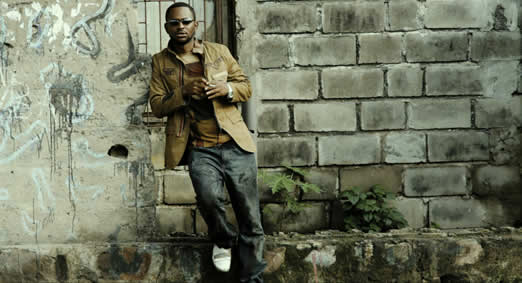 Viva Riva! Is the story of Riva, a small time operator who has just returned to his hometown of Kinshasa, Congo after a decade away with a major score: a fortune in hijacked gasoline. Wads of cash in hand and out for a good time, Riva is soon entranced by beautiful nightclub denizen Nora (gorgeous Paris-based actress Manie Malone in her screen debut), the kept woman of a local gangster. Into the mix comes an Angolan crime lord Cesar (New York-based African Academy Award winner Hoji Fortuna) relentlessly seeking the return of his stolen shipment of gasoline. Director Djo Tunda Wa Munga’s Kinshasa is a seductively vibrant, lawless, fuel-starved sprawl of shantytowns, gated villas, bordellos and nightclubs and Riva is its perfect embodiment.
Viva Riva! Is the story of Riva, a small time operator who has just returned to his hometown of Kinshasa, Congo after a decade away with a major score: a fortune in hijacked gasoline. Wads of cash in hand and out for a good time, Riva is soon entranced by beautiful nightclub denizen Nora (gorgeous Paris-based actress Manie Malone in her screen debut), the kept woman of a local gangster. Into the mix comes an Angolan crime lord Cesar (New York-based African Academy Award winner Hoji Fortuna) relentlessly seeking the return of his stolen shipment of gasoline. Director Djo Tunda Wa Munga’s Kinshasa is a seductively vibrant, lawless, fuel-starved sprawl of shantytowns, gated villas, bordellos and nightclubs and Riva is its perfect embodiment.
Djo Tunda Wa Munga director of Viva Riva! was born and raised in Kinshasa, the capital of the Democratic Republic of the Congo (DRC) where he spent his childhood. At the age of 10, he left for Belgium, and went on to study art, and later filmmaking at INSAS (Institut National Supérieur des Arts du spectacle et des techniques de diffusion) in Brussels. 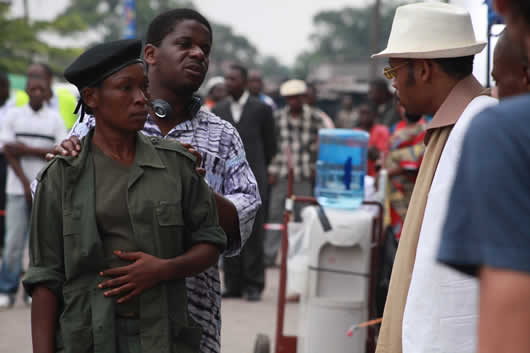
He worked for a few years in Europe in the film industry and went back to the Democratic Republic of Congo to work on documentary projects for the BBC, ARTE and Danish TV, amongst others. He went on to create the first film production company in the DRC, Suka Productions!
Munga served as producer on Congo in Four Acts, a quartet of short films that exposed the distressing reality of everyday life in the Congo. VIVA RIVA! is Munga’s first fiction feature film and the beginning of the New Wave of Congolese Cinema.
Bijan Tehrani: As a filmmaker educated in Belgium and with experience of filmmaking in Europe, you could have an easier professional life working in Europe. You decided to go back to the Congo, where there were no film production houses or film production facilities. This was a bold move, don’t you think?
Djo Tunda Wa Munga: It was, but I think that there were two reasons that 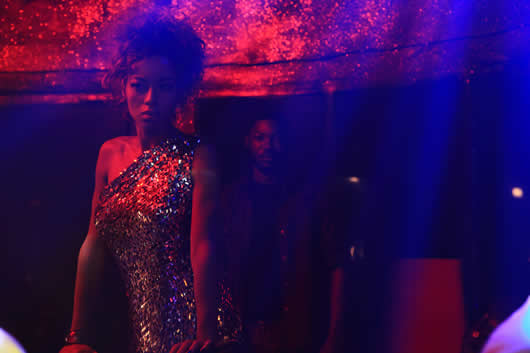 motivated me to go back to the Congo. The first one was that the whole idea behind studying abroad was to go back to our country to help. The second reason was that when I had my short-film screened at the Toronto Film Festival several years ago, I discovered that actually I could tell a really simple story of a little boy living with his sister in a Congolese community, and that by telling my story I could reach an international audience. Therefore, I came to the conclusion that I did not need to stay in Europe or go to North America to try and make films, I could go back to the Congo and take it from there—so, that is what I did. It was not easy and it took a couple of years to get to the starting point and I worked really hard for it, but I am really happy with my choice.
motivated me to go back to the Congo. The first one was that the whole idea behind studying abroad was to go back to our country to help. The second reason was that when I had my short-film screened at the Toronto Film Festival several years ago, I discovered that actually I could tell a really simple story of a little boy living with his sister in a Congolese community, and that by telling my story I could reach an international audience. Therefore, I came to the conclusion that I did not need to stay in Europe or go to North America to try and make films, I could go back to the Congo and take it from there—so, that is what I did. It was not easy and it took a couple of years to get to the starting point and I worked really hard for it, but I am really happy with my choice.
BT: Viva Riva! is a very professional and great looking movie in terms of acting, directing and cinematography; it is amazing that you managed to get the film to such a level of professionalism considering the limitations you had in the DRC.
DM: Thank you for that. I think it was also important for our country, coming from a place with this history; it’s an achievement that took a global effort and it takes a lot of hard work. I would say, on a larger level this achievement really makes a change. The critics have been critical, saying that Nigeria may be the biggest film industry in Africa. This film will be a new proposition on how our films will be looked at in the future. When we go back to Congo, we want to rise to the best of our abilities. 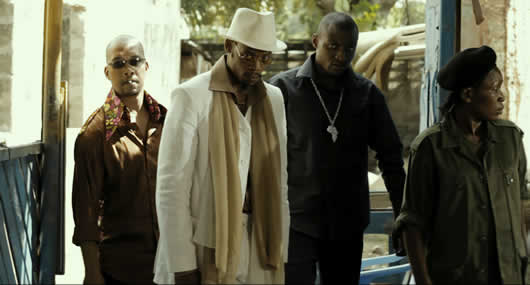
BT: The subject of the film is interesting; there is a human side to the film despite the themes of corruption and violence.
DM: Absolutely. I think that film is the best medium to reach the masses. Another thing is that we have a humanities complex in Africa in regards to how we relate to each other, so it was difficult to convey that. It is very important to keep the human element because it’s an important part of the process and involves the viewer.
BT: Kinshasa as a city plays like a character in the movie, how did you manage to convey that?
DM: I tried to first learn from other films. I tried to find out how to put different elements of the film into the city and create a duality whilst retaining the character of the city; it also allows me to give different themes and scenes. I really wanted to create an image of the city and the people of the city that would come to life on screen.
BT: How did you go about casting the film?
DM: That was a very long process. We hired a professional casting director, a woman from Africa, and she brought in a neutral vision; she saw many actors and wanted to get the 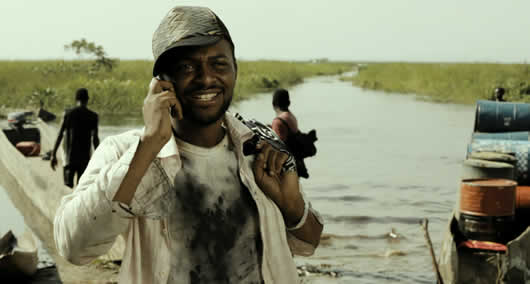 best ones for the script. We took the best of them into a workshop and allowed them to learn about acting in front of a camera and gain some techniques and confidence. After two months here and there, they stopped rehearsing and I gave them the script. At the end, the actors were motivated and they were rehearsing themselves—this made it much easier for us to shoot scenes with them.
best ones for the script. We took the best of them into a workshop and allowed them to learn about acting in front of a camera and gain some techniques and confidence. After two months here and there, they stopped rehearsing and I gave them the script. At the end, the actors were motivated and they were rehearsing themselves—this made it much easier for us to shoot scenes with them.
BT: Did you allow the actors to improvise on the set?
DM: No, not on the set. When we were rehearsing, we would improvise and test things during. I would take some of those things that they would bring in and incorporate them into the film. So this part of improvisation was a connection between the script and what they could bring out themselves.
BT: How did you go about determining the visual style of Viva Riva! ?
DM: The idea is that a gangster movie or a thriller has to have a certain aesthetic, so my background being from art school, it was important to create a world which would look different in terms of the nightlife with specific colors and themes, coupled with a contrasting daytime aesthetic. I really focused on trying to bring a sort of poetry in the night and some harsh light in the daytime. 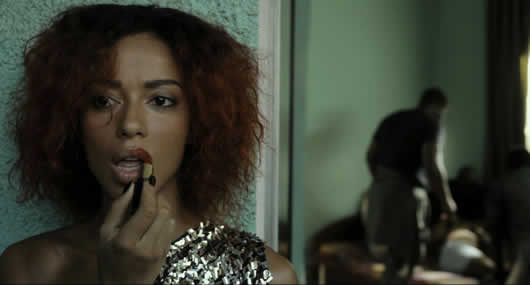
BT: How did you balance the layers of stories and characters in the film?
DM: I write a lot and I write very quickly. For me, I wanted to find a balance between all of the layers and characters of the film that allowed the viewer to connect with the story on a personal level.
BT: Viva Riva! evokes some nostalgia to the gangster movies of the 30’s and 40’s, was this intentional?
DM: Actually, those films inspired me! It is funny because some critics said that this film reminded them of the great Hong Kong films of the 80’s. These similarities, however, were not intentional and I really tried to make something original.
BT: What is the next project that you are working on?
DM: I would love to do a Chinese-Congo story; we have to work with the city and the people, but I would love for this to be my next project.
Viva Riva! Was previously screened at The Best of Recent Belgian Cinema, organized by the Consulate General of Belgium in Los Angeles and sponsored by ELMA.
Viva Riva! opens in Los Angeles on June 10, 2011 at Landmark’s Nuart Theatre

